Interviewed by Ong Jo-Lene
Very much like in-the-heat-of-the-moment sex and an accidental pregnancy, Angela Kuga Thas is an accidental sexuality rights activist and feminist. She’s a hardcore believer in sexual rights and she became more engaged in local sexual rights activism in 2002 after questioning her own role in global and regional activism.
Her passion and commitment to sexual rights and sexuality issues in Malaysia were further ignited with the passing of the late Toni Kasim. Often seen as the voice of diplomacy by friends and colleagues, she has been invited to speak at and has conducted numerous workshops, seminars, and fora in the Asia Pacific Region. She is the co-founder of KRYSS (Knowledge and Rights with Young People through Safer Spaces) and the Gender Evaluation Methodology Research and Business Services Coordinator at the APC (Association for Progressive Communications).
In this interview, Angela speaks about the annual Malaysian sexuality rights festival – Seksualiti Merdeka that took place at The Annexe Gallery from 13 – 17 October this year. The coalition has also spearheaded the “It Gets Better Malaysia” project which has recently received a lot of press with its series of videos with the tagline “Saya Gay, saya OK” or “Anda gay, saya OK”
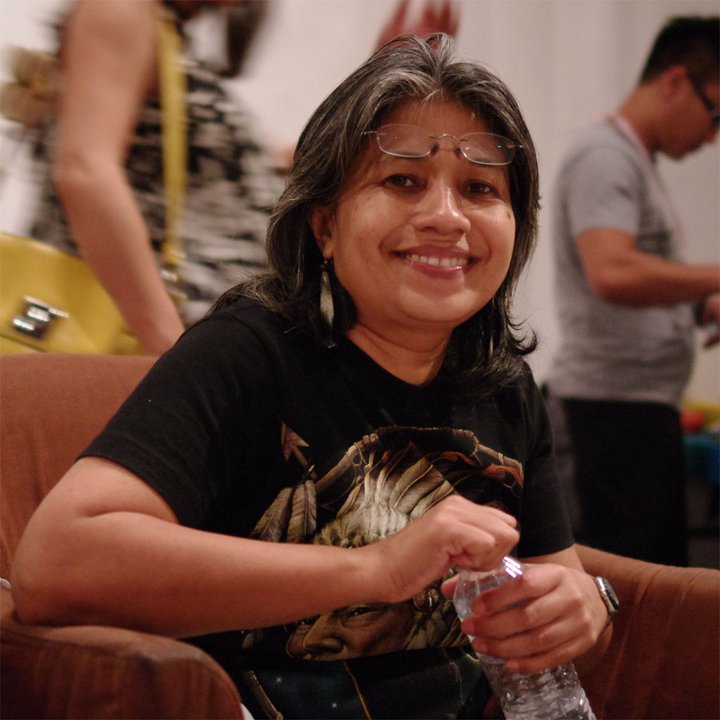
1. Whenever I tell people about Seksualiti Merdeka – a sexuality rights festival, many end up giggling and asking “Sex also got rights meh?” Can you explain to us what is meant by the term “Sexuality Rights”?
It’s a pity that I don’t get to meet these people. I would have had a good laugh too. But if we really think about it, yes, one of our rights under sexuality rights is our right to have mutually consensual sex with an adult.
It is certainly not a common term nor commonly heard. The women’s rights movement advocates for “sexual rights.” It is the accepted concept and term within the human rights framework, and it includes the issue of sexual orientation and gender identity.
For Seksualiti Merdeka, we chose to emphasise Sexuality Rights because often, stigma and discrimination occurs based on a person’s exercise of their sexuality when it falls outside of the socially expected “norms.” It’s not only people who are lesbians, gay, bisexual, transgender, intersexed or queer (LBGTIQ) who will face abuse and violence, but it can as well be any woman, young or old, who choses to be sexually active with a man before marriage or outside of marriage. Sometimes, the issue that the woman is sexually active outside of marriage is further exacerbated by the fact that she is having sex with a man who is of a different ethnicity or religion or class.
2. What is the purpose of this Sexuality Rights festival?
We recognised that Malaysians were shying away from talking about their sexuality and the stigma and discrimination that some groups face because of their sexual orientation and gender identity.
We wanted to create a platform of different “actors” who would organise a range of activities that celebrated sexuality as a huge part of our humanity and our basic rights as human beings.
We want people of all forms of sexual orientation and gender identity to feel comfortable and accepted. We wanted people to feel free to come over and ask their questions, to engage in dialogue with others like them and to engage with others not so like them, to be able to debate and if and when necessary, to agree to disagree, but to be able to walk away still respecting one another.
We want people to understand and appreciate the core values that underlie each and every human right – the values of choice, dignity, diversity, equality and respect.
We wanted to advocate against the State and other actors in policing and controlling our sexuality and our own bodies in the expression of our sexuality and gender identities. We wanted the exercise of our bodily integrity to be ours and ours alone.
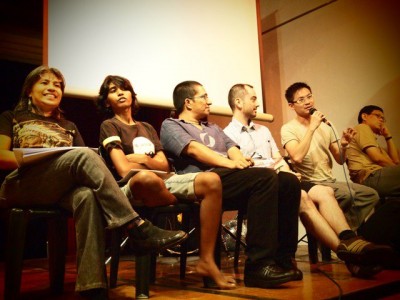
3. Do heteronormative people have anything to worry about in terms of sexuality rights? Do they have a place in Seksualiti Merdeka?
Yes, they do.
One of the most controversial rights for heteronormative people is the choice of when and how many children to bear, if they choose to have children. They may also have children who are non-heteronormative. Heteronormative people also sometimes face the obstacles of whom they want to marry or to decide when they want to marry.
Seksualiti Merdeka offers people who are heteronormative to understand, appreciate and claim their own sexual rights and to help them understand and appreciate the sexuality of others who are non-heteronormative. There are more similarities than differences between the two.
4. Share with us how and why did you get involved with Seksualiti Merdeka?
I felt it was timely and much needed, but more than that, Seksualiti Merdeka was a very exciting proposal. When I first learnt of it, I could already see the start of a sexual rights movement more progressive than any other that I’ve seen in any other country.
One that works across all sexual orientations and gender identities, all kinds of communities that are minorities and who have been marginalised, one that embraces diversity and strives to remain inclusive despite the many challenges. And to be in a position to support and contribute to building such a movement, it was an opportunity that comes only once in a lifetime, an opportunity that I could only dream about until then.
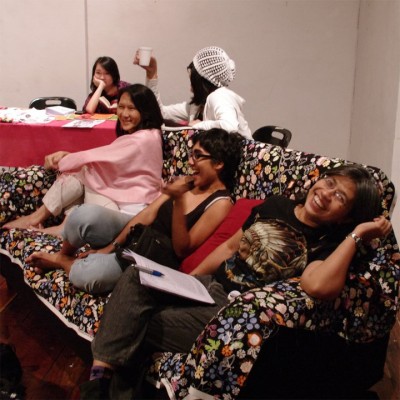
5. How has Seksualiti Merdeka grown and evolved over the past 3 years?
Since 2008, we have attracted a range of allies and supporters from groups such as Bar Council Malaysia, United Nations, Amnesty International, SUARAM, KRYSS, etc. and many individuals too.
Sometimes think, our growth has been quite organic. A loose coalition of organisations and individuals are behind the organising and we’ve grown in numbers. Other times, I think maybe there is some sort of structure in our growth, some sort of strategic targetting, but when I sit down and really think about it, we have approached groups and individuals with a lot of faith and nothing much else to offer, except for what we say we are committed to achieving, with very limited and often insufficient resources, and armed with a lot of love, our passion and our time. In return, we gain their trust and their willingness to work with us, to build on each of our strengths so that we are closer to achieving what we’ve set out to do.
Our audience has also grown in the three years. The only possible explanation that I can come up with for our growth is our shared values, the way we uphold human dignity for all who come to the festival, and our ability to appreciate, accept and respect diversity. We are very Malaysian in that way. I really believe this are the reasons why we have managed to grow, despite the odds stacked against us.
6. Tell us more about this year’s festival and its theme, We Are Family.
I love this theme. I’d like to keep it as a theme, but I am sure, collectively, we can think of something else that’s just as good for next year.
I thought it was a very apt and timely theme. Families do not break up because of sexual diversity. Families break up because parents cannot accept their children as who they are. Families break up because parents sometimes find themselves feeling lost and afraid – fearing that stigma, discrimination and social ostracisation would be targetted towards them from the larger society.
This is a very real fear, and we should stop to ask ourselves, “Why exactly should parents have to fear from the larger society?” Are we not all equally human beings with equal rights? Sexual orientation and gender identity are so integral to a person’s identity, yet, there are various members of our Malaysian society who would willingly condemn, persecute and encourage others to do the same.
The theme We Are Family is meant too, for all of us in Malaysia. It is meant to help us remember that we are family, that we can be there for each other, that we can and do have the time to try and understand one another and appreciate the issues each of us struggle with and the abuse and violence that we may face in our lives. It is meant to help remind all people in Malaysia who have suffered one form of abuse or another based on gender identity and sexual orientation, that there are other people in Malaysia who understand what they are going through and will respect and accept them as who they are.
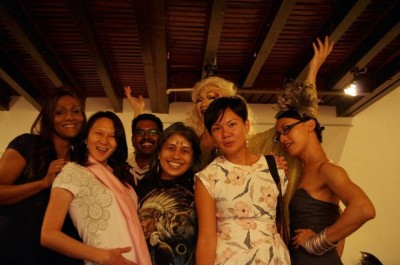
7. What stood out most for you in this year’s events?
What stood out for me most wasn’t the activities or the different events – which were of course, fabulous! It was my own realisation that I have a growing family with old friends who make Seksualiti Merdeka such a positive, loving energy. And just as much with new friends as well, people whom I’ve met at this year’s Seksualiti Merdeka or at events leading up to it. All these people, both old and new, have made my life so much richer with their humanity and I love them for it. Hmm… maybe next year’s theme can be A Growing Family :o)
8. Could you elaborate further about the support and allies that help make Seksualiti Merdeka a success?
We have a number of human rights-based NGOs on board, which include organisations like Amnesty International, SUARAM, Women’s Candidacy Initiative, EMPOWER and PT Foundation. We also have the Malaysian Bar Council and a number of individual but progressive academics who are experts in their respective fields. We have individual activists who have worked on issues in relation to violence against women, women’s rights in Islam, women’s political participation, HIV and AIDS, media, right to information, communication rights, etc.
I love experiencing the continued growing support we receive from people of all walks of life. It’s a very colourful sea of people and organisations that I get to work with every year.
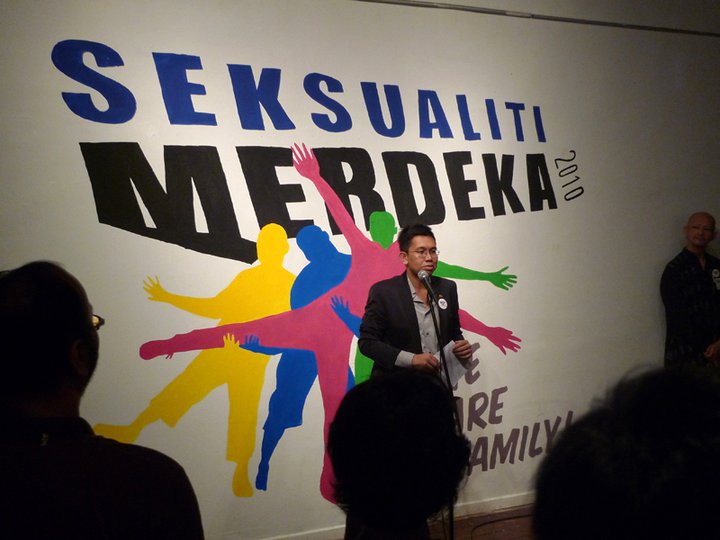
9. Sexuality rights is …… ?
Cautiously. We do not take unnecessary risks. We take calculated risks, and there’s a difference. We consult each other as best as we can. We consider all the different perspectives on what could go wrong just as much as what can go right. Those who come for Seksualiti Merdeka must be willing to respectfully engage in dialogue or debate. It’s a standing and unique invitation that the festival sends out.
10. What do you envision for Seksualiti Merdeka in the next 5 years?
Always bigger and better, with more people coming to support and to speak about sexuality and sexual rights for all. I see the festival going to different cities in Malaysia, and where others are taking the initiative to organise mini “Seksualiti Merdeka” festivals or sexuality rights activities of their own in their respective cities that would lead up to a grand national festival. I see the festival taking different forms and different types of initiatives as more and more people take collective ownership over the achievement of the goals of Seksualiti Merdeka.
11. What are your own hopes for Malaysia and the changes you would like to see with respect to sexuality rights and the acceptance of our sexual diversity?
I would love to see more parents, siblings and friends of lesbians, gays and transgenders join us. I would love to see these parents, siblings and friends finding the courage within themselves to initiate their own activities during Seksualiti Merdeka that speak to these issues of unwarranted stigma and discrimination.
I would love to see a more sincere discussion on the issues of unwanted pregnancies and baby dumping that will go beyond talking about criminalising those who have sex out of wedlock to non-judgemental sex education that begins at home.
I would love to see education that encourages men and boys to stop seeing women and girls as their personal playgrounds, and to regard them with respect as fellow human beings.
I would love to see people of authority taking responsibility and seriously re-examining their role in the suicides that have taken place because of their relentless persecution.
I would love to see people of authority taking responsibility and seriously re-examining their role in the perpetuation of sexual abuse when transgenders and sex workers are arrested.
I would love to see laywers and judges upholding equality before the law and to recognise the unconstitutionality of any law that criminalises anyone based on sexuality or sexual orientation and gender identity.
I would love to see Malaysians stand up and say “Discriminating against someone based on their sexual orientation or gender identity or sexuality, is just as bad as discriminating against someone based on their ethinicty, disability or religion.”
See Also:
- 10 Things you were too shy to ask about Seksualiti Merdeka by Ong Jo-Lene
- For Malaysian Gays, A Hope for a Better Tomorrow by Pang Khee Teik
- A Place to call home by Ong Jo-Lene


Purnomo Yusgiantoro,
The Delhi High Court in 2009 declared Section 377 of the Indian Penal Code (the same as ours) to be unconstitutional as being in violation of a person's personal liberty (Article 21 of the Indian Constitution/Article 5 of the Malaysian Constitution).
So I still think you misunderstand the point the article is trying to make.
Purnomo
Thx, glad you liked it despite the errata. If not for these forums to allow us to communicate matters like these without the mindless plebians up in arms, we'd still be governed by fear, or a viciously uncaring civil court or any religious system that exhorts sex negativity due to lazy mindedness, malicious compliance that runs counter to the Spirit of Faith, or simple parochilism backed by greed and wealth.
The kindred spirits among humanity surely will bring freedom from the tyranny of those who hurt than balance, let all reap what they have sown, with interest.
Skylark,
My understanding of the law is sex between a man and another man is illegal whether the other man gives his consent or not (which implies both man as adults, based on your understanding on consent). And it's from the Penal Code which applies to all.
AgreeToDisagree,
Two words: Nice article.
If a person is a Child or Adult is a state of mind too, even though physical age differs. Consider that some people do not mature mentally until their 30s or later and remain quite immature. Nutrition today means most people physically maturing earlier, and with educational standards improving, younger minds likely are also maturing faster as well.
Ageism opposes consideration against being too young and too old as well, age after all is not a state of mind for some, but a lack of or noticeable wasting of body due to DNA breakdown – that in fact might one day be reversed to a point that OLD AGE might be a choice rather than a state of being.
Sometimes it is impossible to tell if a person is of a particular age (some aging faster slower) and this one size fits all approach within law as well as other factors becomes a stumbling block and an avenue for abuse of either party or the parents of the any considered a 'child', where most important is that justice and the right of association in an intimate capacity, should not be denied any who wish to act upon their wish to get married or engage in a relationship. This can be applied to either mental or physical maturity, not withstanding the desire for the parent to make a person REMAIN a child in a form of psychological imprisonment.
As biological viability is a major consideration, even more complicated and worrying, are casual relationships in young persons with older persons, as well
as parental attitudes which also shape their child's behaviours (consider the Human Rights Charter Article 26(3) – Parents have a prior right to choose the
kind of education that shall be given to their children and this could be subject to abuse, even while the prevention of purported abuse could in turn result in
abuse of the Parents as well via alienation or other biased judgments simetimes from religiously or socially entrenched individuals with feminist agendas,
abuse backgrounds or plain neurotics and sociopaths getting a kick out of inflicting suffering on all parties).
These are extremely sensitive topics but ultimately could be composed into a simple checklist that should be considered for penning into law. Perhaps as follows :
1) Parental awareness and parental consent to relationship if determined to be psychologically immature
2) Consensuality (without element of bribery/coercion/manipulation or paedo-grooming)
3) Biological viability
4) Psychological maturity (it is arguable that exposure to certain necessary literature or social environments or responsibility makes an adult an adult, not the age of the person, adult or child neural structure or set responses being the same in any other person)
5) Marital status/Casual relationship(the second should considers the above 4 points first)
A couple should not be impinged on by proponents or condemners, even religious institutions (such as in abortion or even prophylactics), or have the private feelings between the individuals concerned invaded upon or strung out as a battlefield for failed persons or indeed failed legal systems (think Section 377B which had caused much suffering and discrimination) working out their character flaws or neuroses.
Use the checklist, and consider first and foremost the 2 individuals' TRUTHFUL opinions (make sure nothing is scripted too, groomers beware) BEFORE considering your own opinions or attempting to impose them. Freedom and self determinism is the only principle of life (aparth from equitable distribution of wealth and land) and the Word of the Law must be encompass and have room for the Spirit of the Law.
Punishing is secondary and a society governed by CONSCIENCE and awareness is better than one governed by fear and imposed ignorance (presumably for social order).
Being grounded enough and matured enough with lots of intelligent and open minded individuals, how about taking on the below proposal/discussion at your next forum :
Sex is no different from breast feeding, being a bodily function and must be given equal social space. After Breast Feeding Booths, shall the next Sexuality Merdeka be the world platform for introducing the " Sex Booth "? This Could be easily be incorporated into a third annex for public toilets perhaps, though that would be quite inappropriate to the Procreative Principle of Humanity and that separate booths away from toilets for this purpose be built?
Purnomo,
Refer to the word "consensual". That clearly implies everyone being an adult.
A child is taken to not be able to consent. My understanding of the law is sex with a minor is rape whether the child gave its consent or not.
So I think you have failed to understand the entire article.
Skylark,
I got problem understanding the word 'an adult'. Does that mean only one has to be 'an adult'?
With everything has to be defined today, I cannot find the word 'natural' in that statement, something that the pakcik Mormon would do, as opposed to what the pastors were busted for.
Purnomo,
"sexuality rights is our right to have mutually consensual sex with an adult."
What part of this do you not understand?
"We want people of all forms of sexual orientation and gender identity to feel comfortable and accepted."
There are Mormon pakciks who have 3 wives and all of them are about 15 years old. Wonder whether this form of sexual orientation be accepted.